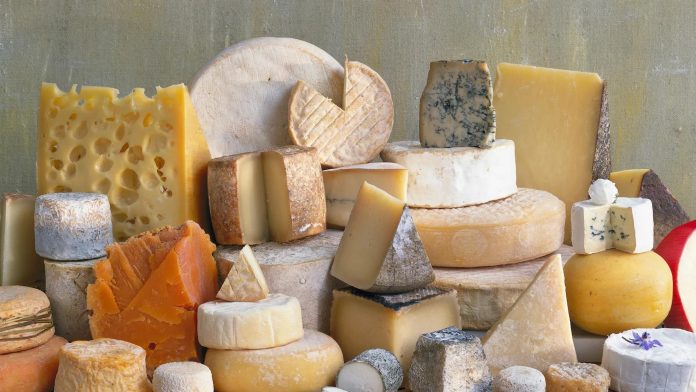A trial in Norway has shown a daily piece of cheese could indicate a way of preventing osteopenia (bone thinning) and osteoporosis.
But not all cheeses are equally effective.

Researchers, led by Dr Helge Lundberg of the Skjetten Medical Centre in Norway, randomly allocated volunteers to groups eating either a daily 57g portion of Jarlsberg or 50g of Camembert cheese, but no other cheese in their diet, for six weeks.
After this the Camembert group eat Jarlsberg for another six weeks.
Jarlsberg and Camembert have similar fat and protein contents, but unlike Camembert, Jarlsberg is rich in vitamin K which is known to be important for bone health.
Jarlsberg is fermented with a bacterium (Proprionebacterium freudenreichii) that produces DHNA (1, 4-dihydroxy-2-naphtholic acid), a substance which combats bone thinning and increase new bone formation in mice.
The team took regular blood samples from all the participants to check for key proteins, osteocalcin (which acts as a biomarker for formation of new bone), a peptide (PINP) involved in bone turnover, vitamin K and blood fat levels.
In healthy people bone tissues are regularly broken down and replaced.
In the Jarlsberg group key biochemical markers of bone turnover increased significantly after six weeks, but in the Camembert group, levels of PINP remained unchanged. Bone-health biomarkers, including PINP increased significantly after switching to Jarlsberg.
Cheese consumption did not cause harmful levels of blood cholesterol and was not a trigger for diabetes.
Blood fats increased slightly in both groups after six weeks. But levels of total cholesterol and LDL (harmful) cholesterol fell significantly in the Camembert group after they switched to Jarlsberg.
Glycated haemoglobin – the amount of glucose stuck in red blood cells—fell significantly in the Jarlsberg group, while it rose sharply in those eating Camembert. But after switching to Jarlsberg it fell significantly in this group too.
Calcium and magnesium fell in the Jarlsberg group but remained unchanged in the Camembert group. The researchers speculated that calcium levels in blood dropped due to these key minerals forming new bone.
Professor Jonathon Hodgson of Edith Cowan University said there is evidence that dairy products, especially yoghurt and cheese help prevent fractures.
“This trial has shown that all cheeses are not the same.
“Osteoporosis and osteopenia are an important risk for people in their 70s and 80s, but you can’t carry out a trial where they eat a portion of cheese every day for five years and count the occurrence of fractures.
“So, we have to extrapolate from shorter studies on younger people.”
The study authors wrote this is a small study in young and healthy people designed to explore novel pathways linking diet and bone health, the results need to be interpreted with great caution as the study participants will not necessarily be representative of other groups.
And it shouldn’t be taken as a recommendation to eat a particular type of cheese.




















Add Comment